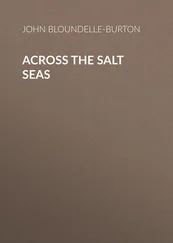John Bloundelle-Burton - Denounced
Здесь есть возможность читать онлайн «John Bloundelle-Burton - Denounced» — ознакомительный отрывок электронной книги совершенно бесплатно, а после прочтения отрывка купить полную версию. В некоторых случаях можно слушать аудио, скачать через торрент в формате fb2 и присутствует краткое содержание. Жанр: foreign_antique, foreign_prose, на английском языке. Описание произведения, (предисловие) а так же отзывы посетителей доступны на портале библиотеки ЛибКат.
- Название:Denounced
- Автор:
- Жанр:
- Год:неизвестен
- ISBN:нет данных
- Рейтинг книги:4 / 5. Голосов: 1
-
Избранное:Добавить в избранное
- Отзывы:
-
Ваша оценка:
- 80
- 1
- 2
- 3
- 4
- 5
Denounced: краткое содержание, описание и аннотация
Предлагаем к чтению аннотацию, описание, краткое содержание или предисловие (зависит от того, что написал сам автор книги «Denounced»). Если вы не нашли необходимую информацию о книге — напишите в комментариях, мы постараемся отыскать её.
Denounced — читать онлайн ознакомительный отрывок
Ниже представлен текст книги, разбитый по страницам. Система сохранения места последней прочитанной страницы, позволяет с удобством читать онлайн бесплатно книгу «Denounced», без необходимости каждый раз заново искать на чём Вы остановились. Поставьте закладку, и сможете в любой момент перейти на страницу, на которой закончили чтение.
Интервал:
Закладка:
John Bloundelle-Burton
Denounced / A Romance
CHAPTER I
A HOME COMING
It was a wild and stormy sea through which the bluff-bowed Galliot laboured, as, tossed first from one wave to another, she, with the best part of her gear stowed away and no sail on her but a close-reefed main-topsail and a spanker, endeavoured to make her way towards the Suffolk coast. On the poop, the captain-a young man of not more than thirty-hurled orders and oaths indiscriminately at his crew, every man of which was a good deal older than himself, while the crew themselves worked hard at hauling up the brails, going out on the gaff to pass the gaskets, and stowing the mainsail-yard. But still she laboured and rolled and yawed, her forefoot pointing at one moment almost to the Dutch coast and at another to the English-she had left Calais thirty hours before, intending to fetch Dover, and had been blown thus far out of her course-and it seemed as though she would never get any nearer to the land she wished to reach. And, to make matters worse, lying some distance off on her starboard beam-though too far to be distinguished through the haze in the air and the spume of the waves-was a large vessel about which those on board could not decide as to whether she was one of King George's sloops or-a privateer. The young captain trusted it was the first, since he had no quarrel with either his Majesty or his navy, and had no men who could be pressed, while the passengers in the cabin-but this you shall read.
In that cabin there sat four persons, three men and a woman-the last of whom shall be first described. A woman young-of not more than twenty-four years of age-fair and well-favoured, her wheat-coloured hair brought back in a knot behind her head, above which, as was still the custom of the time for ladies when travelling, she wore a three-cornered hat. Wrapped in a long, collarless coat, square cut and possessing no pockets-also the custom of the time-it was still easy to perceive that, underneath, was a supple, graceful figure, and, when-as was occasionally the case-this long coat was thrown open so that the wearer might get a little relief from the stuffiness of the cabin, the beauty of that figure might plainly be perceived beneath the full scarlet waistcoat embroidered with gold lace, which, by its plenitude of pockets, atoned for the absence of any in the coat. Her face was, as has been said, a well-favoured one, oval, and possessing large blue eyes and delicate, thin lips, and with upon it even here, on this tossing sea, a fair rose and milk complexion, while in those large eyes the observer might have well imagined he saw a look of unhappiness. Also, too, a look of contempt whenever they rested on the man who, as she leant an elbow on one side of the table between them, leant one of his on the other.
They rested on him now with much that look as, pushing over to her a glass of burnt wine which the cabin-boy has just brought in at his orders, as well as some ratafia biscuits, he said:
"I would counsel you, my lady, to partake of a little more refreshment. I have spoken with the master outside who says that by no chance can we make Harwich ere nightfall. Your ladyship, excellent sailor as you are, must have a care to your health."
"My health," she replied, "needs no care, either from myself or you. And when I am athirst I will drink, as when I am hungry I will eat. You had best offer your refreshments to our fellow-passengers."
The man to whom she spake was but two or three years older than herself-and was her husband, Simeon Larpent, Viscount Fordingbridge. He, too, was well dressed in the travelling costume of the day, wearing a black frock with a gold button, a black waistcoat trimmed with gold, black velvet breeches, and a gold-laced three-cornered hat, while on the table lay a silver-hilted hanger that slid about with every motion of the vessel. In looks he was her equal, being, however, as dark as she was fair, but of well-cut, even features and of a clear complexion. He wore, too, his natural hair, cropped somewhat short as though a wig might in other circumstances be easily assumed, but the absence of this article of dress in no way detracted from his appearance.
As her ladyship spoke he darted one swift glance at her from under his eyelids-a glance that seemed to embody in it a full return of all the coldness and contempt with which she had addressed him; and then, acting on her suggestion, he turned to the two other inhabitants of the cabin and said:
"Come, Father Sholto, and you, Fane, come and take a sup of the liquor. 'Twill do you both good. Come and drink."
"Ah, the drink, the drink," exclaimed the latter, "well, give me a sup. Maybe 'twill appease a qualm. Kitty, me child," turning to Lady Fordingbridge, "why do ye not do as your husband asks? 'Tis a good stomachic-by the powers! how the barky rolls."
"I want nothing," her ladyship replied, lifting her eyes to him with almost as contemptuous a glance as when she had previously raised them to her husband, and then relapsing again into silence.
"I, too," said the other man, who had been addressed as "Father Sholto," "will take a sup, she does roll badly. Yet, my lord," he said, as he poured some out into a mug that stood by the liquor, "let me persuade you to be more guarded in your expressions. To forget, indeed," he went on, while his cold grey eyes were fixed on the other, "that there is such a person as 'Father Sholto' in existence for the present; that such a well-known ecclesiastic is travelling in your Lordship's esteemed company. For," he continued, after swallowing the liquor at a gulp, "I do assure you-Fane, see that the door of the cabin is fast! and that none of the crew are about! – you could not make your entry into your own country, could not return to make your peace with King George, the Elector of Hanover-with a worse companion in your train than the man who is known as 'Father Sholto.' Therefore-"
"Therefore," interrupted Lord Fordingbridge impatiently, "I will not forget again, Mr. Archibald. Enough!"
"Therefore," continued the other, as though no interruption had occurred, still in the cold, low voice and still with the cold grey eyes fixed on his lordship, "it is best you do not forget, at least, at present. Later, if your memory fails you-I have known it treacherous ere now-it will be of little importance. Charles Edward, the Prince of Wales, is at Edinburgh, soon he will be at St. James'; but until he is, remember what we are. You are the Viscount Fordingbridge, but lately succeeded to your father's title, and a convert from his Jacobitism to Hanoverian principles; her ladyship here, who is ever to be depended upon, follows your estimable political principles; her respected father, Mr. Doyle Fane, has, he avers, no politics at all; and I am Mr. Archibald, a Scotch merchant. You will remember?"
" Peste! Yes. I will remember. Tutor me no more. Now, Fane, the sea abates somewhat-go and discover if we are near the English coast. And, Mr. Archibald, I have a word to say to my lady here, with your permission. As I am at the expense of this passage, may I ask for a moment's privacy with her? Doubtless the air on the deck will refresh you both."
"Precisely," replied the other. "We will not intrude unless it grows again so rough that we cannot remain on deck. Come, Fane."
When both had left the cabin Lord Fordingbridge turned to his wife who still sat, as she had done from the beginning of Mr. Archibald's remarks, indifferent and motionless as though in no way interested in what had passed, and exclaimed:
"You hear, madam, the circumstances in which I return to my own. 'Tis not too agreeable, I protest. We are Roman Catholics, yet we come as Protestants, Jacobites, yet under the garb and mask of Hanoverians. And in our train a Jesuit priest, arch-plotter, and schemer, who passes as a respectable Scotch merchant. A sorry home coming, indeed!"
Читать дальшеИнтервал:
Закладка:
Похожие книги на «Denounced»
Представляем Вашему вниманию похожие книги на «Denounced» списком для выбора. Мы отобрали схожую по названию и смыслу литературу в надежде предоставить читателям больше вариантов отыскать новые, интересные, ещё непрочитанные произведения.
Обсуждение, отзывы о книге «Denounced» и просто собственные мнения читателей. Оставьте ваши комментарии, напишите, что Вы думаете о произведении, его смысле или главных героях. Укажите что конкретно понравилось, а что нет, и почему Вы так считаете.












